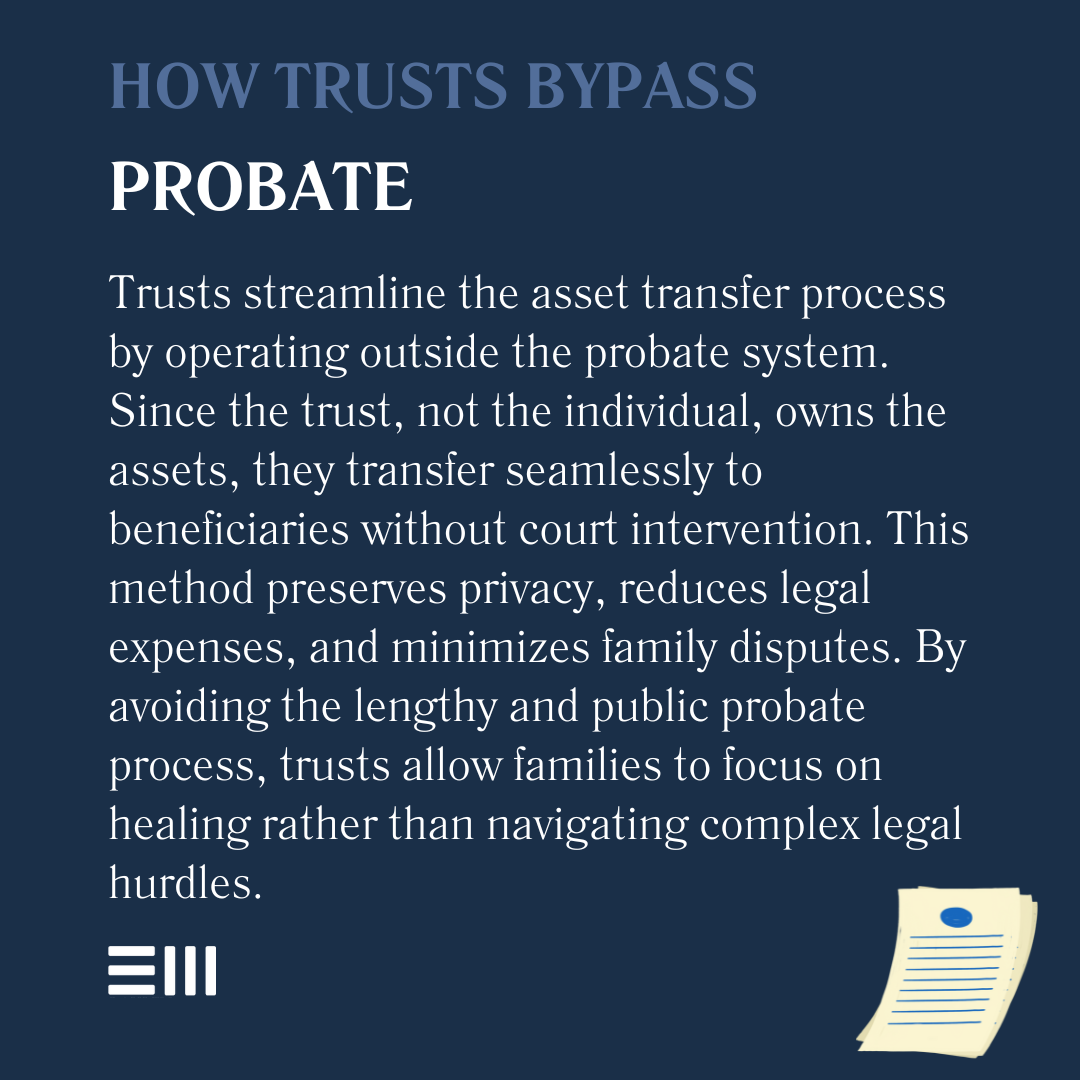Every family's journey through settling an estate writes a unique story in probate courts across Alabama.
Behind the mahogany doors of these courtrooms, some estates move swiftly through the system, while others become entangled in months or years of proceedings.
The difference often lies in one pivotal decision: whether the deceased chose to place their assets in a trust.
While a will guides assets through probate like a map through a complex maze, a trust creates a direct path, bypassing the courthouse entirely.
Understanding Probate in Alabama
Before exploring how trusts bypass probate, let's examine what happens when estates go through the probate process in Alabama courts.
Probate serves specific purposes but often creates unnecessary complications for many families.
Key aspects of probate include court supervision, asset inventory, creditor notification, tax clearance, and final distribution.
In Alabama, even simplified probate procedures can take months, while complex estates might remain in court for years.
Probate fees, which can include attorney costs, court fees, and executor fees, often erode the value of an estate, leaving less for beneficiaries. Additionally, the public nature of probate means that details of your estate become part of the public record, potentially compromising privacy.
The time, expense, and public nature of probate lead many Alabama residents to explore trust-based solutions. Recognizing probate's impact helps inform better planning choices.
How Trusts Bypass Probate
Trusts create a separate legal pathway for transferring assets that operate outside the probate system. This alternative approach offers significant advantages for many families.
Trust assets avoid probate because they're technically owned by the trust, not the individual. When someone passes away, their trust continues operating according to their instructions, without court intervention. This seamless transition protects privacy and saves time.
Moreover, trusts can reduce familial conflicts by clearly outlining how assets should be managed and distributed.
By avoiding probate, families can avoid costly legal battles and the stress of prolonged court involvement.
Building your estate plan around trusts can dramatically reduce or eliminate probate involvement. This strategic approach often benefits both trustees and beneficiaries, fostering smoother transitions and stronger family relationships.
Types of Trusts That Avoid Probate
Different trust types offer various ways to bypass probate while serving other estate planning goals. Understanding these options helps you choose the right approach.
- Maintain control during your lifetime;
- Transfer assets smoothly after death;
- Allow modifications as needed;
- Protect privacy;
- Enable incapacity planning;
- Simplify asset management; and
- Reduce administration costs.
Irrevocable Trusts:
- Provide enhanced asset protection;
- Reduce estate tax liabilities;
- Protect assets from creditors; and
- Ensure a secure legacy for beneficiaries.
Each type of trust serves different purposes and offers unique benefits. Your choice of trust type depends on your specific situation and goals.
Consider how different options align with your needs when planning your estate.
Funding Your Trust Properly
Creating a trust only provides benefits when assets are properly transferred into it. This crucial step, called funding, requires attention to detail.
Essential funding steps include:
- Retitling real estate;
- Transferring bank accounts;
- Updating investment accounts;
- Assigning business interests;
- Moving personal property;
- Addressing retirement accounts; and
- Reviewing insurance policies.
Failing to fund a trust effectively can result in assets being subject to probate despite the trust's existence.
Regular review and updates help maintain the trust's effectiveness and ensure that newly acquired assets are also included.
Working with an experienced estate planning attorney can simplify this process and provide peace of mind.
Common Questions About Alabama Trust-Based Planning
Families often have questions about using Alabama trusts to avoid probate.
Here are answers to help you understand your options better.
What Assets Can Go Through a Trust?
Almost any asset can transfer through a trust, including:
- Real estate;
- Bank accounts;
- Investments;
- Business interests;
- Personal property;
- Life insurance proceeds; and
- Vehicles and equipment.
Understanding which assets can be placed in your trust helps you develop a comprehensive plan that truly avoids probate for your entire estate.
How Long Does Trust Administration Take?
While probate might take 6 to 18 months, trust administration often completes within:
- Simple estates: 3-6 months;
- Average estates: 6-9 months; and
- Complex estates: 9-12 months.
These shorter timeframes allow families to settle estates more efficiently and begin the healing process sooner.
What Makes a Trust Invalid?
Avoid these common problems:
- Improper execution;
- Inadequate funding;
- Unclear instructions;
- Missing signatures; and
- Improper amendments.
Recognizing these potential pitfalls helps ensure your trust remains valid and effectively serves its purpose of avoiding probate.
How Much Does Trust Planning Cost?
Initial costs often include:
- Trust creation: $1,500-3,000;
- Asset transfers: $500-1,500; and
- Related documents: $500-1,000.
While these costs may seem significant initially, they typically represent substantial savings compared to probate expenses and provide valuable peace of mind.
What Happens to Debts in a Trust?
Understanding debt handling:
- Trustees manage legitimate claims;
- Trust assets may pay valid debts;
- Creditor notification may still apply;
- Time limits affect claims; and
- Some assets receive protection.
Proper debt management within your trust ensures a smooth transition of assets while protecting your beneficiaries' interests.
Do I Still Need a Will with a Trust?
Consider these factors:
- Catch overlooked assets;
- Name guardians for minors;
- Back up trust provisions;
- Handle personal items; and
- Express final wishes.
A complementary will adds an extra layer of protection to your estate plan, ensuring no detail is overlooked in your legacy planning.
Build Your Protected Legacy Today
Your estate plan should reflect your wishes while protecting your family from unnecessary complications.
A well-crafted trust not only avoids probate but also ensures your legacy remains intact for future generations.
Our experienced team helps you create and fund trusts that avoid probate while serving your broader estate planning goals.
Contact us to explore how trust-based planning can benefit your family.
Let us help you take the next step toward securing a protected legacy and achieving peace of mind.


